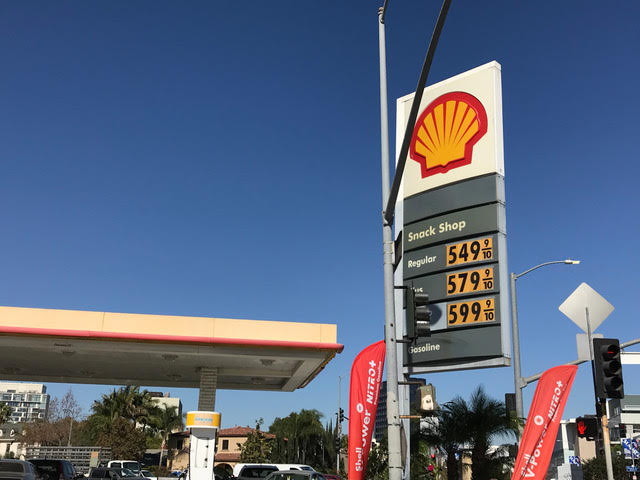
Activists: Dems Propose $200 Payments to Offset Rising Cost of Living
By McKenzie Jackson | California Black Media
Blondy B. is an Uber driver and budding social media content creator in West Los Angeles. When he first started seeing the high cost of gas posted on service station pylon signs in his neighborhood, he says his frustration was met with a sense of disbelief at how fast prices were shooting up.
“I was like, ‘Yo, what the …,” said the 31-year-old, adding an expletive for emphasis. “It has been mind-blowing,” he said.
Blondy B. says it used to take $75 to fill his SUV’s tank. Now, it costs nearly $110.
He says dollars he was stacking to pursue his California Dream are now being poured into his gas tank.
The average cost of a gallon of gas in the Golden State has increased over $1 during the last month, according to the American Automobile Association (AAA).
“Sometimes with Uber, you wait five, 15, or even 30 minutes to get a ride,” he said. “Now, whenever I’m done with a ride, I park right there, shutdown the car, and wait for the next call.”
Uber and Lyft are both tacking on a surcharge of 55-cents per ride paid to drivers to offset the high costs of gas.
Santa Monica resident Clint Thompson, an avid cyclist, has spent more time walking and riding his bicycle than driving this month. He says the cost to fill his car’s tank is $120.
“It’s horrible,” he told California Black Media.

Like Blondy B. and Thompson, millions of drivers across the Golden State and around the U.S. are feeling the pain of record high prices at the gas pump. According to AAA, the average cost of regular gas per gallon in California was 5.847 on Sunday. The national average for regular gas was $4.30 per gallon.
On March 18, Democrats in the California Senate and Assembly presented a plan to provide $200 payments to each taxpayer in the state and their dependents. Under the plan, the state will send out the rebates to households with incomes of up to $250,000 to offset the costs of food, gas and other services family need.
Based on initial estimates, the plan could cost the state $6.8 billion.
“Speaker Rendon and I made a commitment to the people of California that we would find a solution to help people get through the financial hardships imposed by the rising cost of fuel and consumer goods,” said California Senate Pro Tem Toni Atkins (D-San Diego).
“We’re holding true to that promise and have developed a proposal that would help a vast majority of Californians,” she added.
Before that, on March 14, California Assembly Democrats unanimously voted 40-18 against a proposal their Republican colleagues pushed to suspend California’s 51-cent per gallon gas tax.
“Wow. Every @AsmRepublicans lawmaker voted to take 50 cents off the gallon of gas. Not a single Democrat Assemblymember supported this effort to lower gas prices,” Assembly Republican leader James Gallagher (R-Yuba City) tweeted.
Then, on March 16, Assembly Democrats announced a proposal for a $400 tax rebate that would be sent to every California taxpayer — whether they drive or own an automobile or not – to offset the high price of gas. The $400 amount is based on an estimate of what the total annual cost would be to cover the .51-cent-per-gallon tax for the average driver.
“A rebate is a better approach than suspending the gas tax — which would severely impact funding for important transportation projects and offers no guarantee that oil companies would pass on the savings to consumers,” said Assemblymember Cottie Petrie-Norris (D-Laguna Beach) in a statement.
The Rev. Shane Harris, the president of the People’s Association of Justice Advocates (PAJA) in San Diego, said the $400 rebate doesn’t help enough.
On March 17, he sent a letter to Gov. Gavin Newsom and legislators. In it, Harris proposed what he called the Golden State Gas Stimulus, which asks that $1,200 be given to every Californian who has a registered vehicle and makes up to $75,000 annually. State registered vehicle owners that earn between $75,000 and $95,000 would receive $600, according to Harris’ plan.
“A stimulus is extra money, a rebate is essentially giving me back what I own anyway,” Harris said. “My argument is that we need more resources, not money that is already ours. The $400 just does not meet this moment from my perspective.”
Across California, there are 15 refineries supplying gas for transportation to all regions of the state, according to the California Air Resources Board.
On top of that, Californians pay an average of about $1.27 more than the rest of the country per gallon in taxes and fees, including a 51.1 cent excise tax that goes toward road repairs. Other fees included in that amount are climate program costs and local taxes.
PAJA teamed up with several groups — many who share his view about the Dems’ $400 gas rebate plan — to hold a gas giveaway at an Arco gas station in San Diego on March 14. The organizations used $15,000 worth of donated funds to put up to $50 of gas in the tanks of over 320 people’s cars.
Harris said drivers told him that without the donated gasoline they would not have been able to meet routine obligations like getting to work or taking their children to school.
“We were trying to meet a critical need for working class and low-income people,” Harris said. “One mother handed me a card and was crying. She didn’t know if she would be able to pay for her medication or gas this week.
Her medication was $70. Meeting this need was critical for those most impacted by the prices at the pump.”
A lot of individuals, Harris noted, are terrified of high gas prices, and those telling people to take a bus or trolley or buy an electric car instead of driving their current automobile are in the wrong.
“I don’t know how you tell a low-income person or a working-class person they should buy a $50,000 electric car in the spur of a moment when gas prices are at an all-time high,” Harris said. “It is very elitist to tell working class people to get on the bus when the bus takes three hours to get from one location to the next.”
Blondy B. said California’s leaders need to realize if individuals like him, who have service jobs, are priced out of driving their automobiles the whole state will pay.
“They aren’t going to listen to me,” Blondy B. said of elected officials. “They need to help out. If prices keep going up, people are going to suffer.”



